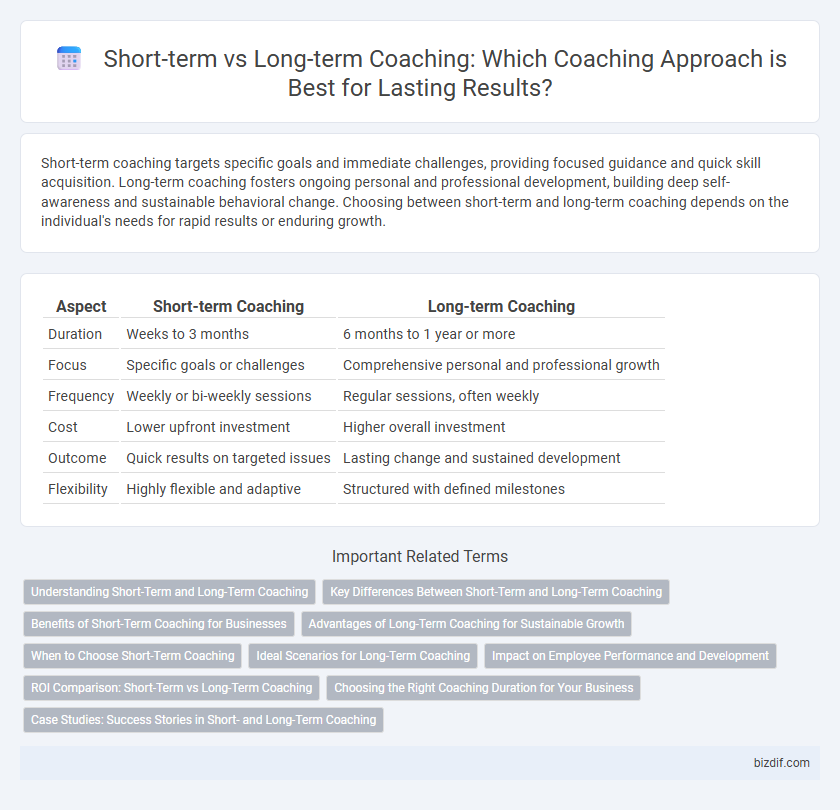Short-term coaching targets specific goals and immediate challenges, providing focused guidance and quick skill acquisition. Long-term coaching fosters ongoing personal and professional development, building deep self-awareness and sustainable behavioral change. Choosing between short-term and long-term coaching depends on the individual's needs for rapid results or enduring growth.
Table of Comparison
| Aspect | Short-term Coaching | Long-term Coaching |
|---|---|---|
| Duration | Weeks to 3 months | 6 months to 1 year or more |
| Focus | Specific goals or challenges | Comprehensive personal and professional growth |
| Frequency | Weekly or bi-weekly sessions | Regular sessions, often weekly |
| Cost | Lower upfront investment | Higher overall investment |
| Outcome | Quick results on targeted issues | Lasting change and sustained development |
| Flexibility | Highly flexible and adaptive | Structured with defined milestones |
Understanding Short-Term and Long-Term Coaching
Short-term coaching typically targets specific goals or challenges within a limited time frame, offering rapid, actionable insights for immediate improvement. Long-term coaching fosters deeper personal and professional growth by gradually developing skills, mindset, and resilience over extended periods. Understanding the distinct benefits of both approaches helps clients choose the coaching duration that best aligns with their needs and desired outcomes.
Key Differences Between Short-Term and Long-Term Coaching
Short-term coaching targets immediate goals and quick skill development, often spanning a few weeks to months, ideal for addressing specific challenges or achieving rapid progress. Long-term coaching emphasizes sustained personal and professional growth over months or years, fostering deep behavioral changes and strategic development. The key differences lie in the coaching duration, depth of transformation, and goal complexity, where short-term coaching is solution-focused and task-oriented, while long-term coaching supports ongoing accountability and broader life or career evolution.
Benefits of Short-Term Coaching for Businesses
Short-term coaching delivers rapid skill development and immediate problem-solving strategies, enabling businesses to respond quickly to market changes and boost productivity. It offers cost-effective, focused sessions that target specific challenges, leading to fast measurable results and improved employee performance. This agility supports faster decision-making and accelerates organizational growth without the extended commitment of long-term coaching programs.
Advantages of Long-Term Coaching for Sustainable Growth
Long-term coaching fosters sustainable growth by enabling deep behavioral change and continuous skill development, which short-term coaching often cannot achieve. It provides ongoing support and accountability, helping clients maintain progress and adapt strategies over time. This extended engagement enhances the integration of learning into daily practices, resulting in lasting personal and professional transformation.
When to Choose Short-Term Coaching
Short-term coaching is ideal for clients seeking rapid skill development, focused goal achievement, or immediate problem-solving within a limited timeframe. It suits professionals facing specific challenges such as leadership transitions, project management, or communication improvements that require targeted strategies without long-term commitments. Opt for short-term coaching when measurable progress is needed quickly through structured sessions tailored to concise objectives.
Ideal Scenarios for Long-Term Coaching
Long-term coaching is ideal for individuals seeking sustained personal growth, transformational change, and the development of complex skills over time. It benefits professionals aiming to enhance leadership capabilities, emotional intelligence, and strategic thinking through ongoing reflection and feedback. This coaching model supports deep behavioral shifts by allowing continuous goal adjustment and accountability over months or years.
Impact on Employee Performance and Development
Short-term coaching delivers immediate, targeted support that rapidly enhances specific employee skills and addresses urgent performance gaps, driving quick improvements. Long-term coaching fosters sustained personal and professional growth by embedding deeper behavioral changes, enhancing leadership capabilities, and promoting ongoing development. Organizations leveraging both approaches see accelerated skill acquisition alongside durable performance improvements, optimizing overall employee effectiveness and career progression.
ROI Comparison: Short-Term vs Long-Term Coaching
Short-term coaching delivers rapid, targeted results by addressing immediate challenges, often yielding quick ROI through skill enhancement or performance boosts. Long-term coaching fosters sustained growth, deeper behavioral changes, and leadership development, resulting in compounded ROI over time as employees apply new competencies consistently. Organizations investing in long-term coaching typically see higher employee retention, increased productivity, and stronger engagement, amplifying overall business value beyond immediate gains.
Choosing the Right Coaching Duration for Your Business
Short-term coaching delivers targeted strategies to address immediate business challenges, promoting quick wins and rapid skill development. Long-term coaching fosters sustainable growth by embedding deep behavioral changes and strategic thinking essential for evolving market demands. Selecting the right coaching duration depends on your business goals, urgency of issues, and desired impact on leadership and team performance.
Case Studies: Success Stories in Short- and Long-Term Coaching
Case studies reveal that short-term coaching rapidly enhances skills and boosts motivation by targeting specific goals within weeks, yielding measurable improvements in productivity and confidence. Long-term coaching fosters sustained growth and behavioral change through ongoing support and deep self-awareness development, often resulting in transformational career advancements over months or years. Success stories highlight diverse outcomes, with short-term coaching excelling in immediate performance issues and long-term coaching shaping lasting leadership qualities and resilience.
Short-term Coaching vs Long-term Coaching Infographic

 bizdif.com
bizdif.com